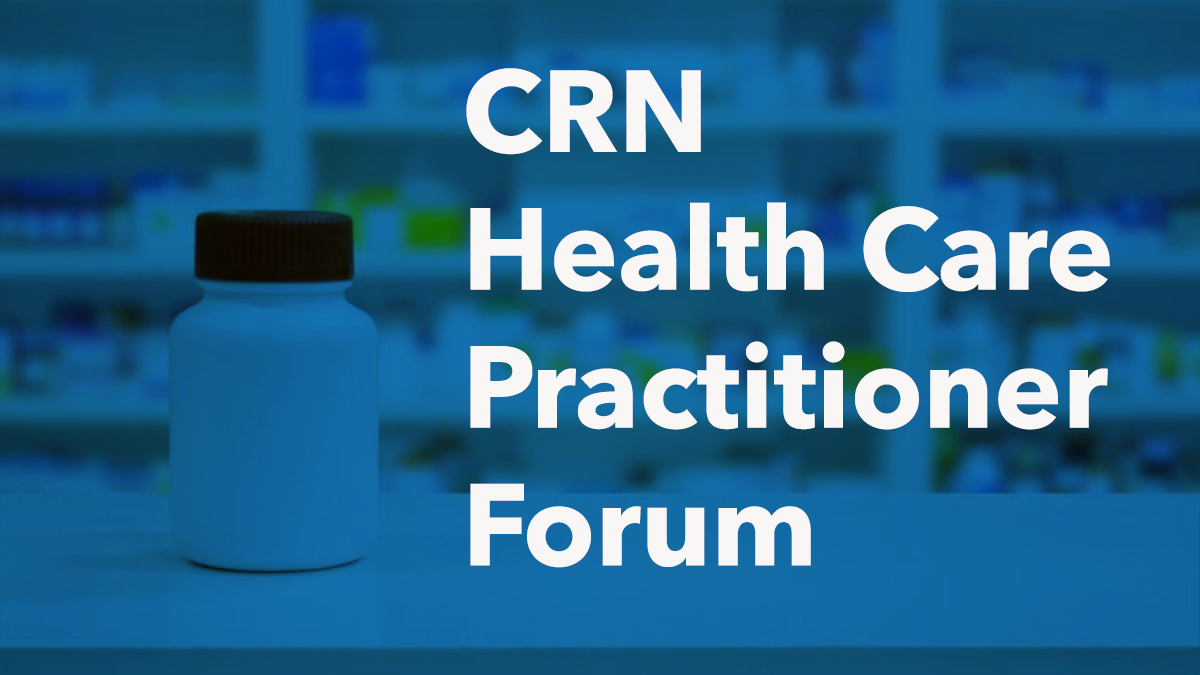
— UNLOCKED DIGEST—
Pushing Back on Drug Preclusion
New Health Care Practitioner Forum
CRN Responds to CBD NDIN Rejection
Deep Dive into Mental Health, Sleep Claims
Sports Nutrition Working Group Update
New Member Mentor Program
The CRN Daily Supplement is the newsletter for members of the Council for Responsible Nutrition (CRN), the leading trade association of the dietary supplement indusry. This quarterly digest provides non-members a sneak peek into our initiatives and industry news. Join CRN to receive your copy daily. Contact Carl Hyland (chyland@crnusa.org) for additional details.
CRN calls for public hearing on drug preclusion provision

"CRN believes FDA should hold a public hearing on how it should interpret the drug preclusion provision overall,” CRN's Megan Olsen, vice president and associate general counsel observed in an HBW Insights article discussing FDA's response denying Sen. Mike Lee's (R-UT) call for a hearing on the agency's handling of N-Acetyl-L cysteine (NAC)—along with answers to several important questions.
“We hope FDA’s response signals that the agency understands the strength of the legal arguments put forth in CRN’s citizen petition and is poised to act promptly to restore full consumer access to NAC as a dietary ingredient." Olsen continued, "In that case, we agree no hearing is needed on NAC as it’s clear from a legal perspective what the outcome should be. However, the preclusion issue is likely to arise again with other ingredients."
This issue will arise more and more often, CRN President & CEO Steve Mister wrote in a recent Natural Products Insider article. He observed, "as drug firms eye longstanding supplement ingredients for their potential therapeutic effects and want to 'clear the decks' of any supplements on the market that might undercut their ability to charge more for the drug version ... The industry needs clarity and balance given that the motivation for the provision is an economic one to protect Big Pharma’s investments and incentives to do drug research—supplement innovation and research should matter too."
New CRN Health Care Practitioner Forum addresses growing practitioner channel

Practitioner channel sales are some of the fastest-growing in the supplement industry, accounting for 9.5% of all sales as of 2019. Sales in this channel are just under $5 billion annually and are projected to exceed $5 billion by the end of 2021 with an estimated overall growth of 6.6%.
CRN's newly-formed Health Care Practitioner Forum (HCPF) will convene its first meeting on Wednesday, Oct. 6, at 3 pm ET for CRN members that serve the practitioner dietary supplement channel or want to learn more about this growing category.
The first meeting of the HCPF will include discussion of:
- How the CRN Foundation Vitamin D & Me! consumer education initiative can be used by practitioners and their patients.
- The current legal status of N-acetyl-L-cysteine (NAC) in relationship to the practitioner market.
Join CRN to gain access to the HCPF and other members-only groups.
CBD NDI notification rejections should concern entire supplement industry

FDA recently rejected NDI notifications (NDIN) for CBD from two supplement companies, "disregarding published peer-reviewed toxicology studies and years' worth of real-world safety evidence,” said CRN President & CEO Steve Mister in coverage from HBW Insight. The agency mischaracterized these products as the same article as prescription drug Epidiolex, which is "plainly is not the same article supplement companies are producing,” Misted noted in Nutrition Insight.
FDA's inaction speaks volumes. Deanie Elsner, CEO of CRN member and recipient of one of the NDIN rejections Charlotte’s Web, emphasized, “This decision affirms the path to regulatory clarity must come from Congress.” Mister noted in Vitamin Retailer, “These mixed messages from FDA are unacceptable, and Congress must exercise leadership by stepping in to end it."
All supplement manufacturers should be alarmed by the NDIN rejections.The disconnect between asking for safety data and then setting impossibly high standards could be brought to bear on almost any ingredient, Mister points out in coverage from New Hope. Read CRN's full statement here.
Experts deep dive into mental health, sleep claims—webinar now available on demand

Mental health and sleep supplement products can benefit consumers as they seek wellness support during these challenging times.
By the numbers: Passing the $1 billion mark, mood and mental health supplement sales grew by 29.4% in 2020 and sleep supplements by 36.6%, with continued growth expected, according to data from Nutrition Business Journal.
Yes, but: Marketers must be mindful of FDA and FTC regulations when making claims. In February, FDA issued 10 warning letters to companies selling dietary supplements claiming to treat or prevent depression and other mental health disorders.
“When developing marketing plans and products, it’s not only about what will sell or what consumers are interested in, we have to ensure we have the regulatory and legal sides taken care of and so substantiation, clinical trials and ensuring you have appropriate structure-function claims is crucial,” advises CRN Vice President and Associate General Counsel Megan Olsen.
Regulatory resources to help marketers steer clear of disease claims include:
- Food Drug & Cosmetic Act section 403(r)(6), Federal Register notice of final structure function rule, and 21 CFR § 101.93
- Small Entity Compliance Guide on Structure/Function Claims
- Structure Function Claims Notifications to FDA—notifications of product claims to FDA in 2021 are accessible within docket FDA-2021-S-0024; and letters of objections are accessible within the docket FDA-1997-S-0006
Go deeper: Access CRN’s webinar, “The New Frontier for Claims: The Disease-ification of Anxiety, Mood & Sleep,” now available on demand.
Olympics shine light on sports nutrition, adulteration issues—CRN Sports Nutrition Working Group to meet again in October

"Contamination and adulteration continue to be notable concerns for dietary supplements, specifically sports nutrition products that are at risk of triggering doping violations in athletes," said CRN's Luke Huber, N.D., MBA, and Jim Komorowski, MS, CNS, of JDS Therapeutics LLC and Chair of CRN’s Sports Nutrition Working Group (SNWG) in Natural Products Insider. They note that heightened attention on elite athletes during the Olympics puts the products athletes use to support their performance in the spotlight—revealing concerns about supplement adulteration.
A CRN SNWG panel of experts from across the sports nutrition sector recently discussed the highest risk supplement categories for adulteration—muscle-building and weight loss supplements. The session, now available on demand, covers:
- Current trends in adulteration
- The emergence of “research only” products
- Consumer education about safe sports nutrition supplement use
CRN's 2020 Consumer Survey on Dietary Supplements indicates that consumers have the lowest confidence levels in the safety and quality of sports nutrition and weight management dietary supplements compared to other categories, Dr. Huber and Komorowski note. However, many rely on these products to help support athletic performance, so "it is critical that consumers who are taking or seeking sports nutrition products understand the difference between a safe, high-quality dietary supplement and a potentially adulterated product."
"As this year’s Olympic Games come to a close, it serves as a reminder for both athletes and consumers to be mindful of the products they take to support their health and wellness and for industry to invest in educational resources to ensure that athletes of all levels have the information they need to make smart decisions around sports nutrition," Dr. Huber and Komorowski urge.
On Oct. 7 from 2–3 pm ET, CRN's SNWG will host guest presenters to discuss leading lipotropic and thermogenic sports nutrition ingredients.
Join CRN to gain access to the HCPF and other member-only groups.
CRN mentor program sets new members up for success
What was most important to OmniActives when the company became a member of CRN was "how to get actively involved in the discussions and plans on key issues CRN is championing on behalf of the industry—whether it's related to science, regulation, policy, transparency in labeling, or the supply chain," Vice President, Global Scientific and Regulatory Affairs Deshanie Rai, Ph.D., FACN notes.
Even as a longtime supplement industry professional with experience as a CRN member with a previous company, Dr. Rai found value in CRN's new member mentor program when she connected as part of OmniActive Health Technologies' membership.
"This one-on-one guidance really enhanced my understanding of how OmniActives could navigate and fully leverage the resources offered by CRN," Dr. Rai observed.
Learn more about other CRN members' experiences here.
The CRN Daily Supplement is the newsletter for members of the Council for Responsible Nutrition (CRN), the leading trade association of the dietary supplement indusry. Join CRN to receive your copy daily. Contact Carl Hyland (chyland@crnusa.org) about membership. Learn more: www.crnusa.org/join


